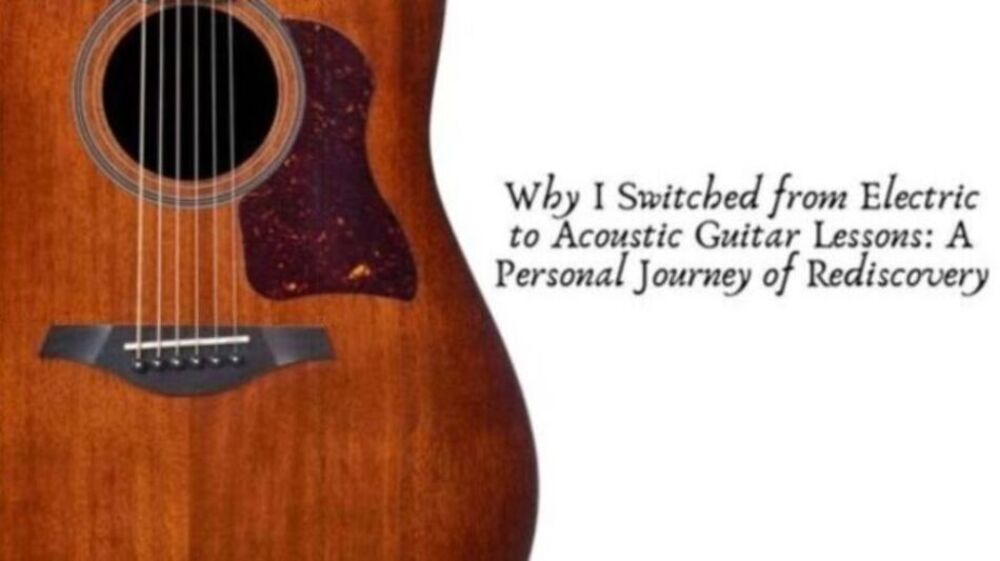


Looking back, I’m grateful for everything the electric guitar taught me. It gave me a foundation, a voice, and some unforgettable memories
Learning to play the guitar is often seen as a rite of passage for music enthusiasts. When I first picked up the instrument, I was captivated by the raw energy and sonic power of the electric guitar. The distortion, the solos, the stage presence — it was everything I thought I wanted. However, after years of lessons, performances, and countless jam sessions, I found myself growing distant from the instrument that once sparked my passion. That’s when I made a surprising change: I switched from electric to acoustic guitar lessons. Here’s the story of why I did it — and how it transformed not only my playing but also my relationship with music.
Like many aspiring guitarists, my journey began with rock and blues. Influenced by legends like Jimi Hendrix, Jimmy Page, and Stevie Ray Vaughan, I was drawn to the sound of wailing solos and crunchy riffs. My first guitar was a cheap electric model paired with a basic amp, and I couldn’t have been prouder.
Electric guitar lessons taught me essential techniques — from bending and vibrato to tapping and sweep picking. I experimented with pedals, explored tone, and even played in a couple of garage bands. It was fun, energetic, and expressive.
After a few years of electric guitar training, I hit a creative plateau. Despite having technical skills, my playing felt mechanical. I could replicate songs note-for-note, but there was a lack of emotional connection. The thrill of plugging in and cranking up the volume had faded, and I found myself skipping practice more often than not.
Part of the issue was the structure of my lessons. They were increasingly focused on speed and technique — scales, modes, shredding. While these skills are undeniably valuable, they no longer resonated with me. I realized I was playing to impress others, not to express myself.
One lazy afternoon, I picked up a friend’s dusty old acoustic guitar. The strings were heavier, the action was higher, and it felt like a totally different beast. But as I strummed a few open chords, something clicked. The tone was rich and honest. There was no amp to hide behind, no distortion to mask mistakes — just pure, unfiltered sound.
That brief moment stayed with me. I started exploring acoustic fingerstyle videos on YouTube, became intrigued by folk and classical arrangements, and slowly developed a new kind of curiosity. Within a few weeks, I signed up for my first acoustic guitar lesson.
Switching to acoustic guitar lessons felt like entering a new world. Here’s what changed:
Acoustic lessons emphasized musicality over mechanics. I learned how to convey emotion through dynamics, phrasing, and subtle timing — skills that often get overlooked in high-octane electric sessions.
Without the effects and amplification of electric guitar, every nuance mattered. I had to refine my finger positioning, learn how to control my strumming patterns, and focus on clean chord transitions. My playing became more disciplined and deliberate.
Acoustic guitar opened up new genres for me: folk, blues, bossa nova, classical, and even country. I started appreciating songwriters like James Taylor, Paul Simon, and John Mayer in a whole new light. My musical tastes broadened, and so did my skills.
Fingerstyle playing became one of my favorite aspects of acoustic guitar. It allowed for self-sufficiency — I could play melody, harmony, and rhythm simultaneously. It also deepened my understanding of musical arrangement.
The switch to acoustic didn’t just improve my guitar playing; it changed the way I approach music — and life. I became more patient, more intentional, and more focused on expression than perfection. I realized that simplicity can be powerful, and that growth often requires letting go of what once defined us.
Looking back, I’m grateful for everything the electric guitar taught me. It gave me a foundation, a voice, and some unforgettable memories. But it was in switching to acoustic guitar lessons that I truly found my sound. The transition wasn’t about abandoning one for the other — it was about evolution, about tuning in to what truly resonates.
